|
Welcome To The Holiday Season!
At this festive time of the year, we want to wish all of you a happy Holiday season full of successful batches of Biodiesel! May the oil from the deep fried turkey titrate low and burn strong this year!
To get ready for all the forthcoming oil, we've brewed up another issue of Biodiesel Review and packed it with great tips for making the most of your Biodiesel! So, pull up a chair, take a breather and enjoy the fun!
|
Getting Set Up For Biodiesel Production
| -by Graydon Blair, Utah Biodiesel Supply
Whether you're with a University, a business, or just someone wanting to get started making Biodiesel in the shed out back, check out this list of things I think every small scale Biodiesel producer should consider as a part of getting set up. I've written each item in outline form to keep it simple.
So, enjoy our list of things I think every Biodieseler should consider!
1) Containers for the restaurants to place their oil in-- Typically these are 55 Gallon drums although some restaurants will put the oil back into the original oil containers -- If you go with 55 gallon drums, purchase these locally as they're incredibly expensive to ship (because of size).
-- The best place to get them is through a container distributor.
-- I'd recommend checking the yellow pages under "containers" and call around for some reconditioned open-top 55 gallon drums.
-- You want open top as restaurants will be much more able to pour their hot oil directly into the drums that way.
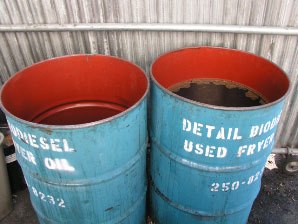
-- Optionally, you can also purchase a lid to place on the barrels to keep them nice & clean.
-- We offer a lid that can help keep thieves from running off with your oil as well Link: http://www.utahbiodieselsupply.com/drumlids.php
2) Something to collect or transfer the oil from the restaurants oil drum to your processing location
-- This can be as simple as actually transporting the drums themselves or using a pump to move oil from the restaurant drum to a tank on the back of a trailer or pickup, or if the restaurant is putting the oil back in the original containers you can simply transport those back to your location
-- Here's an example of how it can be done.
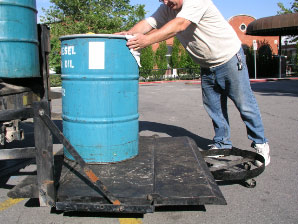
A lift gate on the back of a truck makes quick work of swapping out drums
-- See more: http://www.utahbiodieselsupply.com/photogalleries/collectingoil/
3) Once the oil is back to the shop, you'll need to be able to transfer the oil and filter it from one drum to the other
-- We recommend getting 55 Gal 400 Micron filters for this task.
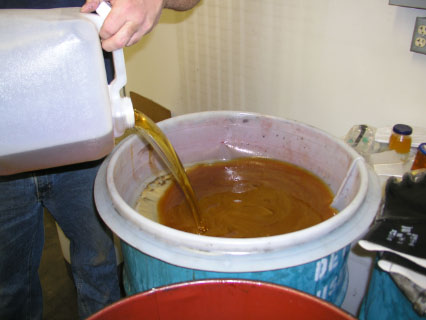
-- They're the easiest to work with and the oil flows through them extremely well
Link: http://www.utahbiodieselsupply.com/filters55gallon.php
4) For transferring the oil, we recommend obtaining a transfer pump.
-- This pump can be as simple as a sump pump with a pipe attached to it, a high output 120 volt electric transfer pump, or even a 12 volt transfer pump.
4) Once the oil is filtered, you'll need something to transfer the filtered oil from the barrel into your Biodiesel processor.
-- The pumps discussed above can work great in this situation as well
-- Just ensure to clean your hoses out prior to pumping as you don't want to pump unfiltered oil into your Biodiesel processor
Here we're using a Monster pump to fill our BioPro with
PROCESSING THE OIL INTO BIODIESEL
1) Obtain a Biodiesel Processor
-- Basically something that can heat the oil to 130-140 Deg F and can mix the oil, methanol, and other chemicals vigorously
-- Examples include an electric water heater, 55 gal drums that are welded together, propane tanks welded together, or even a purpose built manufactured Biodiesel processor such as the BioPro Automated Biodiesel Processor line.
-- The goal is to simply heat, stir, and settle the mixture.
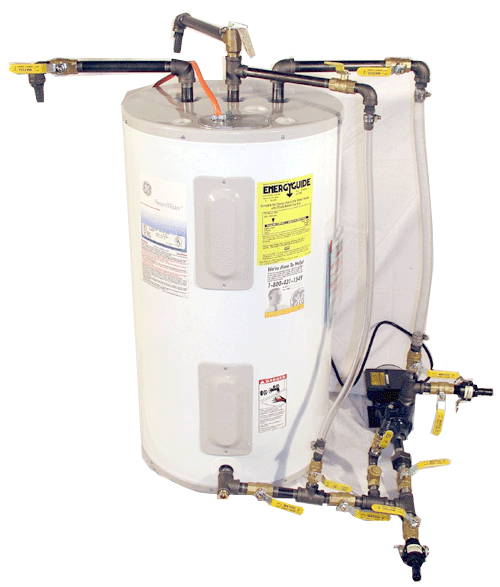 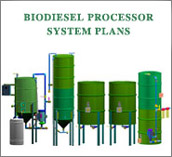 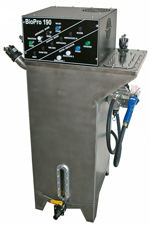
-- There are many designs, be sure to research each one that interests you to make sure it will meet your fuel output needs and time requirements.
-- We also recommend if you buy a pre-built manufactured unit to ask for customer referrals and to call & speak to them about their experiences using the equipment.
-- Learn more about Biodiesel processors here
-- Ensure you have the proper rated electrical power (ie. 120 volt 20 amp circuit, 220 volt, etc)
2) Obtain the Biodiesel production chemicals
-- You'll need the chemicals (NaOH or KOH), methanol, oil, and possibly Sulfuric Acid
-- Methanol usually is best purchased in 55 gallon drums locally
-- Find methanol locally here: Murphys Machines Chemical Locator
-- Chemicals can also be sourced locally as well as purchased on our website
We offer NaOH (Sodium Hydroxide), KOH (Potassium Hydroxide) and H2SO4 (Sulfuric Acid) in various sizes.
2) Water Washing? You'll need access to clean pressurized water (preferably hot) and a way to dispose of dirty wash water.
-- Ensure taps have timers on them to ensure they'll shut off (in case you forget to turn it off manually--trust me on this one. Timers are good; a garage full of 2 feet of water leaking into the house and ruining walls, carpet, furniture, and other valuables is not.)
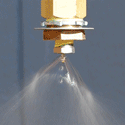 -- Check with your local municipality or septic tank manufacturer to ensure you can discharge the dirty water -- Check with your local municipality or septic tank manufacturer to ensure you can discharge the dirty water
-- It will contain soapy water, trace amounts of methanol, oil, Biodiesel, and catalyst and usually is within most municipal water discharge limits.
-- Wash tanks can be purchased pre-made, built into a processor, or you can build your own
-- We carry a full line of misting products that can be used in wash tanks.
-- Learn more about Biodiesel Wash Tanks here
3) Obtain a good Methanol Pump
-- Methanol is pretty harsh on pump seals so be sure to get one that's up to the task
-- We've seen various styles out there.
Here's two that we carry:
 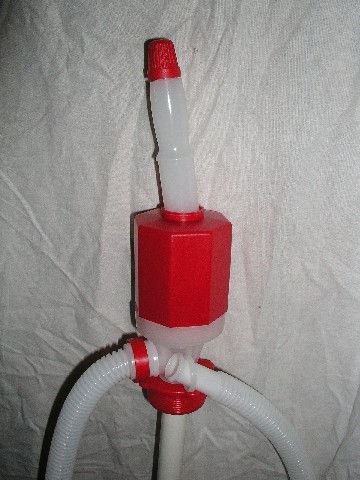
- Heavy Duty Ryton Body Methanol Drum Pump
- HDPE Methanol Siphon Pump
4) Containers To Seal The Catalyst
-- Catalyst (NaOH, KOH) are extremely sensitive to moisture in the air
-- They'll suck it up like a sponge and it'll destroy the catalyst
-- 5 Gallon Buckets with sealable lids work GREAT to keep it dry
-- We stock a really cool screw style lid that has 2 seals (one for the bucket & one for the removable lid) that'll help keep the catalyst nice & dry
 
- Seal Pro Lid - Click here for details
5) Containers To Transfer Glycerin Into
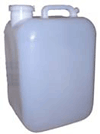
- When draining the glycerin from the BioPro, it's best to have a container to drain it into.
- This can be a 5 gallon bucket, the oil containers that new oil comes in, or our favorite, carboys.
- Carboys are similar to the containers that restaurants get their new oil in only they're made from much more rigid material
- They can be purchased in various sizes, but most commonly they're available in 5 gallon 20 liter varieties
- We offer these in single, double or 4 pack varieties
- They usually come with lids to seal them with, which makes them spillproof
- Be sure to store them away from pets as dogs & cats LOVE the taste of Glycerin. Even Bears have been known to love the by-product too!
TESTING EQUIPMENT:
1) Go/No Go Waste Oil Testing Kits
 - These tests allow you to check waste oil right at the source. - These tests allow you to check waste oil right at the source.
- You add 1 mL of oil to them, shake & take a reading.
- If they stay purple, you're below a set free fatty acid level.
- If they turn the color of the oil, the oil is above the FFA level
- They're available pre-set at 5% FFA or 3% FFA
- 5% = Approximately a 9 KOH Titration
- 3% = Approximately a 5 KOH Titration
- We love these for sampling oil at restaurants before committing to the oil! It's a quick way to know if you really want it or not
2) Waste Oil Titration Kits
- Once the oil is home, you'll need to titrate it
- Titration is a way to identify how much catalyst (NaOH or KOH) will be used
- Using the right amount of catalyst will help insure properly converted fuel
- You can build one yourself or purchase pre-made kits
- We offer a mini, basic, and deluxe titration kit that are extremely popular
- Want to learn more about titrating waste oil? Click here!
3) Water Testing Equipment
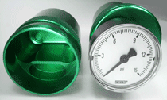 - We recommend testing the oil and the finished Biodiesel for water content. - We recommend testing the oil and the finished Biodiesel for water content.
- Water in the oil is the BIGGEST issue we deal with when trouble-shooting customers issues
- It attacks the catalyst and is absorbed by the methanol and contributes to soap formation
- We use a Deluxe Water Test Kit that can test oil down to 50 Parts Per Million
- It's available with an analog or digital gauge and with a cool carrying case
- You can also use the "hot pan" method or the Weigh/Heat/Weigh method
- Just be sure to ALWAYS measure water content in your oil
- We also recommend testing finished Biodiesel for water as well
- Water is extremely difficult to detect with the naked eye so testing is extremely important
3) Biodiesel Conversion Tests
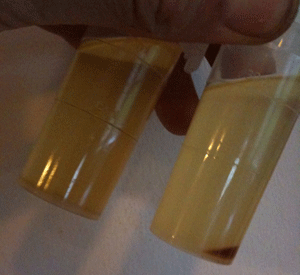 - This test allows you to test your finished unwashed Biodiesel to ensure a full conversion occured - This test allows you to test your finished unwashed Biodiesel to ensure a full conversion occured
- Used 3 mL of Bidiesel & 45 mL of Methanol
- When performed correctly, it can indicate conversion of Biodiesel with extreme accuracy
- We recommend using either graduated centrifuge tubes or
45 mL sampling vials
- We also offer a complete Biodiesel conversion test kit in basic and deluxe models
- Learn more about how to perform this important test by clicking here
- We always test our Biodiesel for conversion and re-react it if it's not completely reacted
3) Soap Test Kit
 - Soap is a by-product produced when Biodiesel is made - Soap is a by-product produced when Biodiesel is made
- Excess soap in Biodiesel can plug fuel filters and leave deposits in diesel engines
- We recommend lowering soap levels as low as possible before using Biodiesel in diesels
- When Biodiesel is finished being washed, to ensure all the soap has been removed we strongly recommend testing it for soap content
- Our Biodiesel Soap Test Kits are available in basic, deluxe, and ultimate versions to meet your unique testing needs and include detailed instructions for use.
- ASTM Soap level equivalent limits are also included to identify when your fuel has had the soap sufficiently lowered enough.
- If you use Dry Wash Technologies in any manner, we strongly urge you to test your fuel for soap content as visual inspections are difficult to detect soap without water present.
4) Magnetic Stirrers
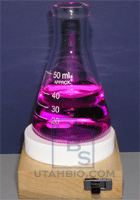 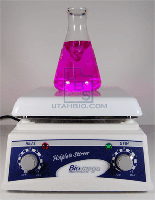 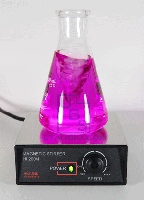
- When performing oil titrations, soap testing, or making small mini batches, a magnetic stirrer is extremely useful.
- They're commercially available in all sorts of sizes and with various features
- From battery powered portable stirrers to bench top heated magnetic stirrers, there's one to fit your exact needs
- We stock 4 varieties ranging from $41.95 clear up to our top of the line heated/magnetic stirrer for $269.00
- Portable Battery Powered Stirrer, Basic Magnetic Stirrer, Stainless Steel Magnetic Stirrer, and a Ceramic Plated Heated Magnetic Stirrer
STORING FINISHED BIODIESEL
- Once the Biodiesel is reacted & finished, most people like to store the fuel in a container outside of the processor.
- We've always stored it in 55 gallon plastic drums.
- They're cheap, easy to come by (used from car washes) and are great
storage containers for Biodiesel.
- We've also seen a really cool design for dispensing the fuel. View it here
- We don't recommend storing it in metal drums though; over time they can rust causing rust deposits to end up in the finished Biodiesel
FILTERING FINISHED FUEL
 - Once Biodiesel is produced, it can be filtered to through fuel filters to ensure it's ready for use in diesel vehicles - Once Biodiesel is produced, it can be filtered to through fuel filters to ensure it's ready for use in diesel vehicles
- We recommend using at least a 10 micron Biodiesel compatible fuel filter
- These can be purchased through Murphys Machines as well as JME Sales
- By filtering prior to using in diesel engines, it will allow the typically more expensive on board fuel filters to last longer
- Bag filters can also be used and are available in a variety of sizes as well
- Here's a picture of our BioPro 190 with a fuel filter installed. We've used filters from both Murphy's Machines and JME Sales with great success
SAFETY GEAR
- We recommend getting safety googles, safety gloves, a chemical resistant apron, and following good safety guidelines
- We also recommend reading the Pennsylvania State University's Biodiesel Safety and Best Management Practices
- As well as the National Renewable Energy Labs Handling & Use Guidelines
Want to learn more about getting set up & getting started?
Be sure to read our comprehensive "Getting Started Guide" where we cover practically everything from A to Z that you might need to know to get up & running producing this incredible alternative fuel
|
New Products At Utah Biodiesel Supply
| We're always adding to our inventory of great products. Check out the latest crop below!
Turnkey Extreme Raw Power Centrifuge We're pleased to introduce a complete, ready to use, turnkey centrifuge package! It starts with our popular 6,000 RPM Extreme Raw Power Centrifuge, then it gets a special box enclosure for the AC Drive complete with switches and includes 20 feet of heavy duty 12 gauge power cord with a heavy duty plug! It's available with or without the 1,000 watt bolt on heater too!
55 Gal Drum Cone Features
We've added new options to our drum cones! They can now be purchased with a 1.5" opening, a 1" or a 1.25" threaded fitting!
Buy 2 and save on shipping too!
|
|
Thanks for being a part of the Biodiesel Review family! We hope you enjoyed this issue. Do you have a topic you'd like to see covered in future issues? We're always looking for cool topics to cover here so send in your idea! Send it to info@utahbio.com with the subject line NEWSLETTER SUGGESTION.
Sincerely, Graydon Blair
Utah Biodiesel Supply
www.utahbio.com
801-820-5753
|
|
|
Visit Us
On The Web!
|  | www.utahbio.com
We have the largest selection of Biodiesel equipment, supplies, promotional items, tutorials, and videos available anywhere on the web!
Stop by today and see all the exciting things we have to offer!
Visit Us Today!
|
|
|